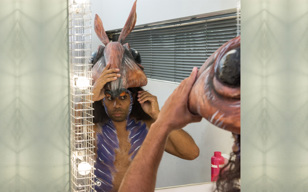Challenging themes include: impact of medical conditions, identity, domestic abuse, ableist attitudes, disability and inclusion.
This play contains coarse language, mature themes, infrequent sexual innuendo, simulated violence, depictions of domestic abuse and disability abuse. It also contains strobe lighting, theatrical smoke effects and loud music.
Themes: Hope, Purpose and Fulfilment, Identity, Imagined Ideals vs Reality, Belonging and Friendship, Self-expression, Mental and Physical Health, LGBTIQ+ Experiences
Drama:
Tae Tae explores an individual seeking to find understanding of how they fit in a world which seems unattainable. Built on verbatim experiences of exclusion and inclusivity and mixed with the magical transformation of a contemporary fairy tale, this show interweaves Contemporary Performance conventions, using a hybridity of Magical Realism, Transformative, Visual and Physical Theatre, offering social commentary throughout the journey.
Styles and Form:
- Contemporary Performance
- Verbatim Theatre
- Magical Realism
- Theatre of Social Comment
- Physical Theatre
- Ensemble Theatre
- Cabaret
Dramatic Conventions:
- Hybridity
- Non-Linear
- Multiple Roles
- Fragmentary props and costumes
- Fluidity of time and place
- Appropriation – Fairy-tale
- Mediatisation
- Narration and Monologue
- Stylised Movement
- Use of song
English and Literature:
- Autobiography and Memoir
- Fairy Tale and Fables
- Narrative Building
- Comparison of texts around similar themes
- Representation – language and identity
QLD Senior Curriculum Links
General Drama
Unit 1: Explore drama as a means to tell stories and share understandings of the human experience. Explore a range of non-linear dramatic forms and hybridity of conventions and forms in storytelling.
Unit 2: Explore the power of drama to reflect lived experience, embracing notions of truth and authenticity in performance.
Unit 3: Explore how drama can be used to challenge our understanding of humanity over time, investigating dramatic styles that are united by social commentary, and that question their world and advocate change.
Unit 4: Develop the knowledge, understanding and skills required to make and respond to dramatic works that reshape and challenge meaning and how stories can be enacted.
General English:
Unit 1: Individual and collective experiences and perspectives of the world.
Unit 2: Engaging in Australian texts, examining the relationship between language and identity
Unit 3: Explore connections between texts with representations of the same concepts and issues in different texts as they resonate, relate to, and clash with one another.
Literature:
Unit 3: Students inquire into the power of language to represent ideas, events and people, comparing these across a range of texts, contexts, modes and forms.






